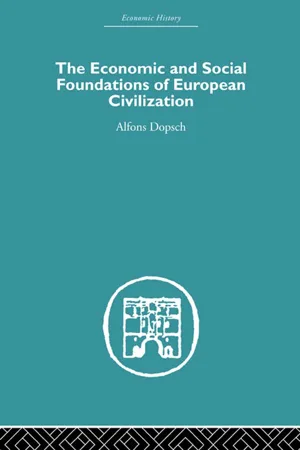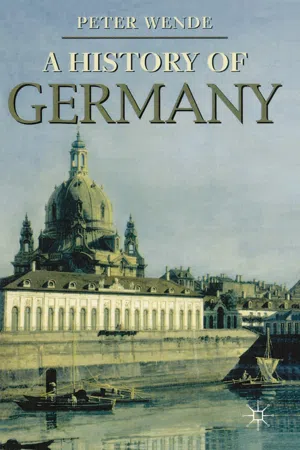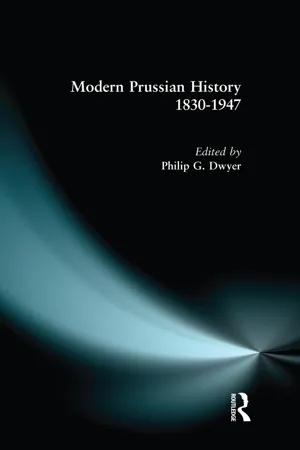History
German Catholic Church
The German Catholic Church refers to the collective body of Catholic institutions, clergy, and followers in Germany. It has played a significant role in the country's history, particularly during the Reformation and the subsequent religious conflicts. The German Catholic Church has also been influential in shaping social and political developments in Germany over the centuries.
Written by Perlego with AI-assistance
Related key terms
Related key terms
1 of 4
Related key terms
1 of 3
3 Key excerpts on "German Catholic Church"
- Alfons Dopsch(Author)
- 2013(Publication Date)
- Routledge(Publisher)
HAPTER VIIIThe ChurchF OR a long time past and for good reason Christianity, and its representative, the Church, have been credited with an important part in the reconstruction of European culture. The Church appears in the first place as intermediary between ancient civilization and the new Germanic states. Recent scholarship has, however, revealed a picture somewhat different in its essentials from the one presented formerly. At one time the foreground was overshadowed by the great work of conversion accomplished in the new Germanic states, the basis of the political power of Catholicism and the Roman Church. With the growing conviction of the existence of a great cultural chasm between “Antiquity” and the “Middle Ages”, and the conception of the latter as a fundamentally new creation, the Church acquired a vital importance as mediator between the old and destroyed past and the new, primitive present. Such hypotheses naturally caused social historians to pay little attention to the earliest period of the diffusion of Christianity, occurring as it did during the decay of antiquity and before the foundation of the Germanic states.Recent detailed research into the beginnings of Christianity in the various West and Mid-European lands has made it possible to form a more accurate judgment on this question. With the increasing realization that the transition from late Roman to early medieval development was accomplished without the catastrophe formerly imagined, the meaning and the essence of that primitive Christianity has been better understood.We know to-day that as early as the end of the second century there were Christian communities not only in Southern Gaul (Lyons) but also in the Rhine and Moselle districts.1 As Christianity had come to Southern Gaul from the East, so it spread quickly from thence along the Rhine to Northern Gaul, thanks to the active movement of trade within the Roman Empire. Its propagation was due not so much to the army as to the traders, craftsmen, and labourers, who came to Gaul from Italy. Even in Roman times Christians were to be found not only in the towns, the centres of trade, but also in the country, though on the whole heathendom lasted longer among the pagani than in the towns. This has been definitely proved by discoveries of early Christian remains in various places—in the Saalburg, in the Taunus, in Wiesbaden, Kreuznach, Bingen, Neuss, Bonn, and Badenweiler.2- eBook - ePub
- Peter Wende(Author)
- 2017(Publication Date)
- Bloomsbury Academic(Publisher)
Doctrinally they all shared Luther’s belief in the absolute authority of the Bible and in justification of the sinner by faith alone. But they differed on other matters, such as on the nature of the Holy Communion which, after the abolition of the Catholic Mass, became the focal point of Protestant worship; on forms of church organization; as well as on the political implications of their spiritual message. Three decades after the formulation of the Augsburg Confession the ‘Heidelberg Catechism’, issued in 1563, became the main confessional statement of the Calvinists.Thus after the middle of the sixteenth century, detailed and explicit confessions (that is, statements of faith) set out the essentials of the different Christian doctrines. These were at the centre of what German historians have recently characterized as ‘confessionalization’ – a process which ‘enabled the spirit of confessional Christianity to penetrate, transform and then reform the state, culture, the legal and intellectual realm, and indeed society’ as a whole.3 In spite of many and various forms of revolutionary change, religion had not become just a private matter; on the contrary, religious beliefs were even more than before a matter of public concern and formed a constituent part of national political identity within the framework of the evolving modern states.THE IMPACT OF THE REFORMATION ON THE COURSE OF GERMAN HISTORY
In considering the manifold far-reaching effects of the Reformation on the course of German history, the historian will come to paradoxical conclusions. In his own time Luther was regarded by many German humanist scholars as a national hero and later German national mythology saw him in the tradition of Arminius, venerating him as one of the founding fathers of the German nation. In actual fact, however, Luther’s Reformation produced profound and long-lasting religious, political and cultural divides within the nascent German nation.Whereas in Western Europe, as soon as confessional conformity had been established – though often as the result of prolonged and bloody inner wars as in France – powerful nation-states were on the advance, the merely partial success of the Reformation in Germany stood in the way of further political and cultural integration. And though at the turn of the century various projects had been discussed and even efforts made to reorganize the constitution of the Empire in order to strengthen its efficiency, the Reformation effected further consolidation of the self-sufficiency of the territorial states. As a minority in the councils of the estates of the Empire, the Protestant rulers had to be watchful guardians of their liberties against the efforts of the emperor and his Catholic allies to restore religious unity. Thus the Reformation intensified the centrifugal tendencies within the loose framework of the Empire. - eBook - ePub
- Philip G. Dwyer(Author)
- 2014(Publication Date)
- Routledge(Publisher)
Even with the ascendancy of social history after 1970, confessional identity and religious culture were seldom taken as seriously as the influence of class and material interests when historians sought to explain the political orientations and behaviour of social groupings. A deeper appreciation of the centrality and force of confessionalism in Prussian social and political life came from new scholarship on the Kulturkampf, that placed this state-church struggle in the context of the unstable process of German nation state building and cultural coalescence, and from research on the social history of Catholicism in Germany, that focused on its distinctive subculture and massive associational life in the years after 1870. This historical scholarship has shed new light on two significant questions. How and why did confessional solidarities and conflicts come to play a central role in society and politics? What were the long-term historical consequences of the polarization and political mobilization of Catholics and Protestants for the national polity? The tendency of Catholics and Protestants to live in homogeneous areas marked the geographical terrain of Prussia with distinct confessional lines. Protestants constituted 95 per cent or more of the population in 13 governmental districts located in the eastern provinces of old Prussia and in the territory of Hanover annexed by Prussia in 1866. Although the Rhine Province, Silesia and Westphalia had more confessionally mixed populations, many counties here were confessionally homogeneous enclaves, with Catholics or Protestants forming a commanding majority of 80 per cent or more. The rural–urban migration that came in the wake of industrialization brought Catholics and Protestants closer together in Berlin, Breslau and other cities in the northern Rhineland and Westphalia
Index pages curate the most relevant extracts from our library of academic textbooks. They’ve been created using an in-house natural language model (NLM), each adding context and meaning to key research topics.
Explore more topic indexes
Explore more topic indexes
1 of 6
Explore more topic indexes
1 of 4


